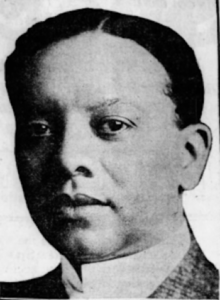
Louis B. Anderson
*Louis B. Anderson was born on this date in 1870. He was a Black journalist and politician who served as alderman of Chicago's 2nd ward from 1917 to 1933.
Born in Petersburg, Virginia, Louis Bernard Anderson moved to Washington, D.C., in 1889 to work in journalism as an exchange reader and journalist. At some point, he was employed by newspaperman Major Moses P. Handy; when Handy was appointed promoter general of the World's Columbian Exposition in 1892, he would follow him to Chicago as his assistant. After the Exposition, Anderson worked as a secretary for Buffalo Bill Cody following the showman's Wild West Show to its ranch in North Platte, Nebraska.
He returned to Chicago and attended the Chicago-Kent College of Law. After graduating in 1897, he befriended Robert S. Abbott, threatened a printer with the loss of city contracts unless it employed Abbott, and became a contributing editor of Abbott's Chicago Defender. Anderson was the victim of an attempted robbery at 29th Street and Wabash Avenue on March 1, 1905. He was not intimidated and was armed. He shot one of the two assailants through his overcoat. Anderson was a partner of Chicago-based Anderson-Watkins Film Co., which in 1913 produced and distributed a three-reel film known as A Day at Tuskegee, and was a lawyer who served as a county attorney.
Political Career
A Republican, Anderson was elected to represent Chicago's 2nd ward in 1917 after his predecessor, Oscar Stanton De Priest. Throughout the 1920s, he was a prominent ally of Mayor William Hale Thompson and was his floor leader in the Council. In 1921, when R. E. Parker of the Chicago Advocate confronted Thompson with the problems of 20,000 unemployed Blacks and charged that the 2nd ward was full of graft and corruption, Anderson defended the mayor, calling Parker a "troublemaker among his people," In 1922 he had architects build his house at 3800 S. Calumet; the surrounding area would take on the name of this house Bronzeville.
Also, in 1922, Anderson served on a committee looking into the Ku Klux Klan's alleged activities in the City's affairs; he and two other aldermen announced to the press that they had received death threats. In 1923, Chicago's wards increased from 35 to 50, while the number of aldermen per ward decreased from two to one. Jackson was redistricted to the new 3rd ward, while Anderson kept his 2nd ward seat. After Thompson's return to the mayoral office following the 1927 election, the rumor was that Anderson was likely to receive the "prize plum" of the chairmanship of the Council's finance committee. Still, Council Democrats worked to keep him off the committee. Later, he considered running for the United States House of Representatives against De Priest, the only Black in Congress. He did not run for re-election in 1933. In 1936, he ran for the Republican nomination for Illinois's 1st congressional district, falling to De Priest.
Personal
Anderson was married to Julia E. Anderson before she died in 1931. He would elope with Oneita Starks in 1933, remaining married to her until his death. Having been ill since Christmas, he died of bronchial pneumonia in his Chicago home on May 28, 1946. Services were held in St. Thomas' Episcopal Church on June 1.